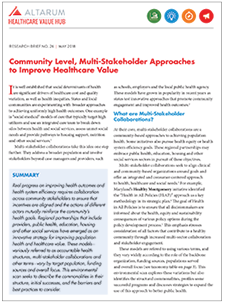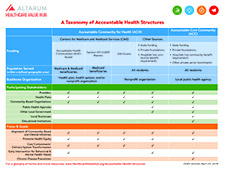Improving Value
Accountable Communities for Health
An Accountable Community for Health (ACH) is a structured alliance of health care, public health and other organizations that plans and implements strategies to improve population health and health equity for all residents of a particular geographic area. There is no single approach used by ACHs —rather, successful ACHs embrace their specific community assets and needs, and then target interventions to goals that are within reach.1
Wide variation makes it difficult to make generalizations about ACHs’ effectiveness,2 but an extensive review published by the National Academy of Medicine documents their potential to drive us toward population health and wellbeing.3 The most effective ACHs will integrate health care, public health and social services to create environments that support wellness needs across the health and social spectrum. Additionally, ACHs’ governance structure, partners and projects should be tailored according to the unique characteristics and circumstances of the communities they serve. Washington’s Accountable Communities of Health Initiative4 (comprised of 9 regional ACHs) is a promising example of this approach.
Notes
1. Mongeon, Marie, Jeffrey Levi, and Janet Heinrich. “Elements of Accountable Communities for Health: A Review of the Literature,” NAM Perspectives. Discussion Paper, National Academy of Medicine (November 2017).
2. Siegel, Beth, et al., “Multisector Partnerships Need Further Development to Fulfill Aspirations for Transforming Regional Health and Well-Being,” Health Affairs (January 2018).
3. Mongeon (November 2017).
4. Washington State Healthcare Authority, "Accountable Communities of Health," (Feb. 15, 2017).
- Healthcare Value Hub: Consumer -Focused Health System Transformation: What are the Policy Priorities? (March 2019).
- CMS, Accountable Health Communities Model.
- Health Affairs Blog: Developing A Common Framework For Assessing Accountable Communities For Health (October 24, 2018).
- The Funders Forum for Accountable Health: Inventory of Accountable Communities for Health
- NASHP: State Levers to Advance Accountable Communities for Health (May 2016).
- Georgia Health Policy Center and Robert Wood Johnson Foundation: Aligning in Action: Allegheny County Health Department (October 28, 2019).








